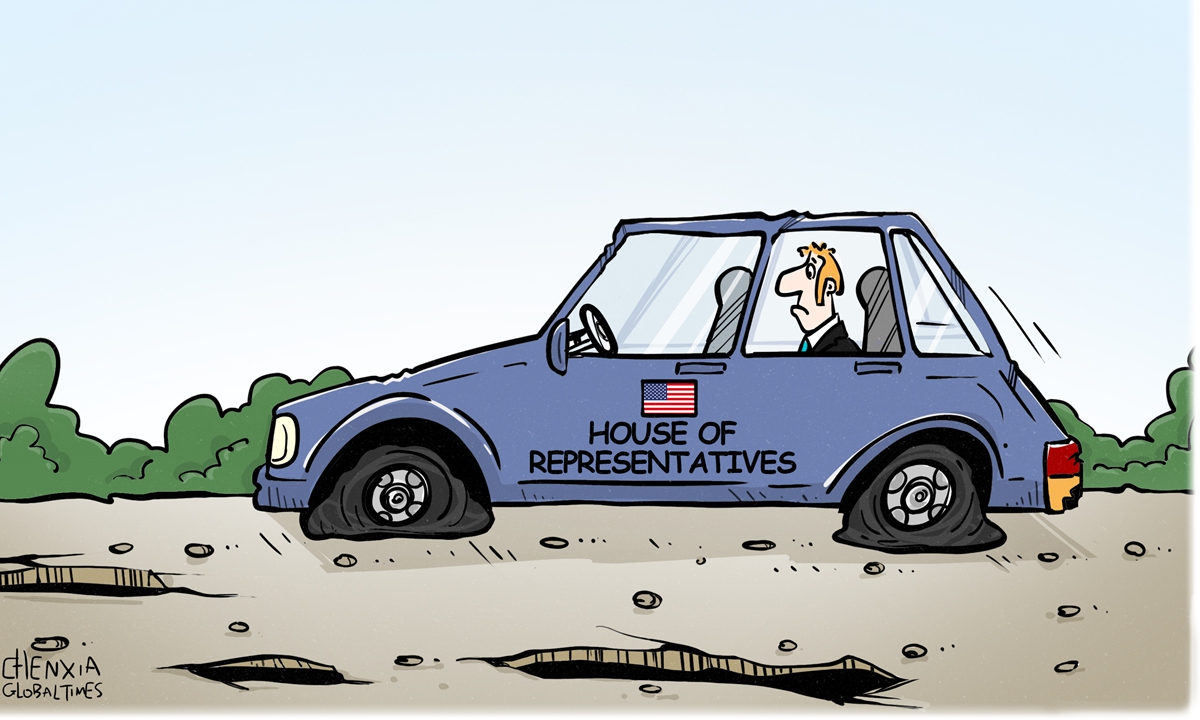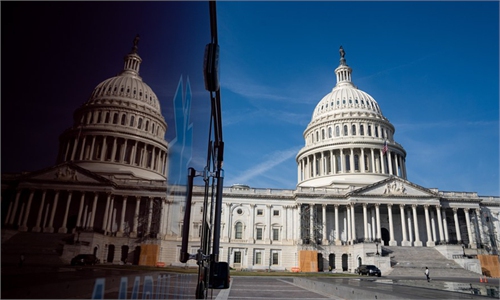
Illustration: Chen Xia/Global Times
After November's contentious midterm elections that saw a change of guard in the House of Representatives from Democrats to Republicans, the new year means a new Congress. Except this year things are a bit complicated: The new Congress can't be sworn in because members-elect can't agree on a speaker.
Members need to first elect a speaker in their first session who then administers the oath of office to new members, previous to entering on any other business. Without a speaker, the third-highest constitutional officer in the US, the House of Representatives is not essentially useless - it is completely useless.
The House can't pass bills or resolutions, can't oversee the federal government, can't pay its members or staff, and incumbent members have even lost their security clearance. That is to say that Congress, e.g., a sub-branch of the federal government, is now not involved in sensitive military and intelligence matters.
The US has not seen a situation like this in more than a century, and this time it's brought on by Republicans loyal to former President Donald Trump. Instead of toeing the party line and voting in leader Kevin McCarthy, MAGA Republicans are refusing to vote for him. They're even holding out despite the fact that, reportedly, McCarthy's team has conceded to every single one of their demands.
Given that, and the fact that Trump-aligned Republicans are notoriously radical in their political activity, McCarthy's odds of winning through attrition seem minuscule. At the same time, Republican holdouts haven't nominated any serious candidate instead of McCarthy, so they don't appear to be organized enough to manage a replacement. And then there's the chance that moderate Republicans could join with Democrats to nominate a coalition speaker - however, political polarization is so rampant in Washington that this is extremely unlikely.
In essence, the spectre of Trump has jammed up the government. His loyalists are destroying the basic function of Congress and his hand-picked nominees in federal court could affirm it. The Republican Party before Trump was indeed not foreign to be an obstructionist unit - but it has now reached an absurd zenith where the federal government is actually eating itself alive with dysfunction.
It's important to recognize this contradiction because it has been played up by corporate interests for decades. The powerful interests that control politics in Washington via the country's plutocratic system, where elections are essentially bought and paid for by the wealthy elite, want an inept, log-jammed government that can't muster the power to regulate. These large cartels thrive in a lax environment where the government can't effectively check their activity or implement changes.
The House of Representatives is arguably the most consequential component of the federal government because it holds the "power of the purse," e.g., the ability to set a budget and decide how that budget is spent. Without a functioning House, that means no appropriations or spending on item. To its logical conclusion, that is a full-on shutdown of the federal government to a point that eclipses anything like the past shutdowns seen in the past several years.
And again, all of this misery and mayhem are all being committed for nothing. The current manifestation of Republican ideology is completely vacuous; in the midst of the current pandemic, inflation crisis and ongoing foreign policy matters, they have not articulated a single concrete policy. That is entirely why they underperformed in November's midterm elections relative to poll predictions and why they can only survive in a system like the US, which includes structural elements including the Senate and Electoral College which serve to prop up the interests of political minorities and special interest groups.
The author is a Prague-based American journalist, columnist and political commentator. opinion@globaltimes.com.cn


